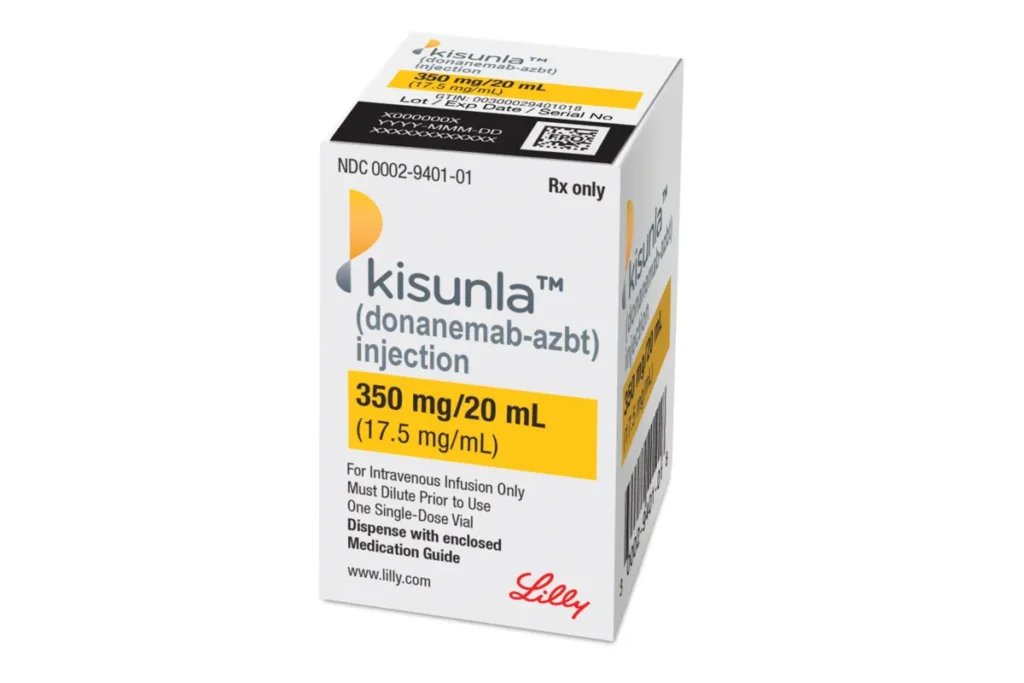The U.S. Food and Drug Administration (FDA) has recently approved a groundbreaking new drug developed by Eli Lilly, designed to treat the early symptoms of Alzheimer’s disease. This approval marks a significant milestone in the ongoing battle against this debilitating condition, which affects millions of people worldwide.
Kisunla: A New Hope for Early Alzheimer’s
The newly approved drug, known as Kisunla (donanemab-azbt), is specifically targeted at patients with mild cognitive impairment or those in the mild dementia stage of Alzheimer’s disease. According to the FDA, patients treated with Kisunla have shown a statistically significant reduction in clinical decline, offering a glimmer of hope for those in the early stages of the disease.
Eli Lilly’s executive vice president, Anne White, emphasized the importance of early treatment, stating, “We know these medicines have the greatest potential benefit when people are treated earlier in their disease, and we are working hard in partnership with others to improve detection and diagnosis.”

The Science Behind Kisunla
Alzheimer’s disease is characterized by the buildup of two key proteins in the brain: tau and amyloid beta. These proteins form tangles and plaques, collectively known as aggregates, which lead to the death of brain cells and subsequent brain shrinkage. Kisunla is an amyloid-targeting treatment, designed to help the body remove the excessive buildup of amyloid plaques, thereby slowing the cognitive and functional decline associated with Alzheimer’s disease.
The drug is administered intravenously every four weeks, with an initial dosage of 700 mg for the first three doses, followed by 1400 mg thereafter. However, it is important to note that Kisunla can cause serious side effects, including amyloid-related imaging abnormalities (ARIA) and infusion-related reactions.
Clinical Trials and Efficacy
The approval of Kisunla is based on the results of the TRAILBLAZER-ALZ 2 study, a Phase 3, double-blind, placebo-controlled trial that evaluated the safety and efficacy of donanemab in participants with early symptomatic Alzheimer’s disease. The trial enrolled 1,736 participants across eight countries, selected based on cognitive assessments and evidence of Alzheimer’s disease pathology.
The study’s findings, published in the Journal of the American Medical Association (JAMA), demonstrated that Kisunla slowed cognitive and functional decline by up to 35% compared to placebo at 18 months. Additionally, it reduced participants’ risk of progressing to the next clinical stage of the disease by up to 39%. Nearly half of the study participants completed their course of treatment with Kisunla in 12 months, highlighting its potential to significantly impact the progression of Alzheimer’s disease.
The Impact on Patients and Caregivers
The FDA’s decision to approve Kisunla has been met with enthusiasm by the Alzheimer’s Association, a non-profit organization dedicated to eradicating the disease. Joanne Pike, the association’s president, stated, “This is real progress. Today’s approval allows people more options and greater opportunity to have more time.
“Alzheimer’s disease is the most common cause of dementia, affecting approximately 6.9 million Americans aged 65 and older. This number is projected to grow to 13.8 million by 2060, underscoring the urgent need for effective treatments. The approval of Kisunla offers new hope for patients and their families, providing an additional option for managing the early symptoms of Alzheimer’s disease.
The Broader Landscape of Alzheimer’s Treatments
While Kisunla represents a significant advancement in Alzheimer’s treatment, it is not the only drug in the pipeline. The Alzheimer’s treatment landscape is rapidly evolving, with numerous clinical trials and studies underway to develop new therapies and improve existing ones.
In recent years, the FDA has approved other Alzheimer’s drugs, such as Aduhelm (aducanumab) in 2021 and Leqembi (lecanemab) in 2023. These drugs, like Kisunla, target amyloid plaques in the brain and aim to slow the progression of the disease. However, the effectiveness and safety of these treatments continue to be the subject of ongoing research and debate.
The Future of Alzheimer’s Research
The approval of Kisunla is a testament to the progress being made in Alzheimer’s research. Scientists and researchers are continually exploring new avenues for treatment, including disease-modifying therapies that target the underlying causes of Alzheimer’s disease. According to a 2024 forecast by the BrightFocus Foundation, there are currently 171 ongoing studies and 134 drugs being tested in clinical trials for Alzheimer’s disease.
Over half of these new treatments are considered potentially disease-modifying, meaning they aim to slow cognitive decline by targeting known pathological changes in Alzheimer’s disease. This approach is intended to give people in the early stages of the disease more time before they begin experiencing severe symptoms like memory loss.
Challenges and Opportunities
Despite the promising advancements in Alzheimer’s research, significant challenges remain. One of the primary obstacles is the need for increased funding and investment in clinical trials. According to Dr. Jeffrey Cummings, a leading Alzheimer’s clinician-scientist, the number of clinical trials and unique treatments has decreased due to a lack of funding from both the federal government and private pharmaceutical companies.
Additionally, the recruitment of participants for clinical trials is a critical issue. Nearly 51,400 participants are needed for all active trials, highlighting the importance of encouraging more people to participate in Alzheimer’s research.
Conclusion
The FDA’s approval of Eli Lilly’s Kisunla marks a significant step forward in the fight against Alzheimer’s disease. This new drug offers hope for patients with early symptomatic Alzheimer’s, providing a potential means to slow the progression of the disease and improve quality of life. As research continues and new treatments emerge, there is renewed optimism for a future where Alzheimer’s disease can be effectively managed and, ultimately, cured.
The journey to develop effective Alzheimer’s treatments is far from over, but the progress made thus far is encouraging. With continued investment in research, clinical trials, and innovative therapies, the dream of a world without Alzheimer’s disease may one day become a reality.


